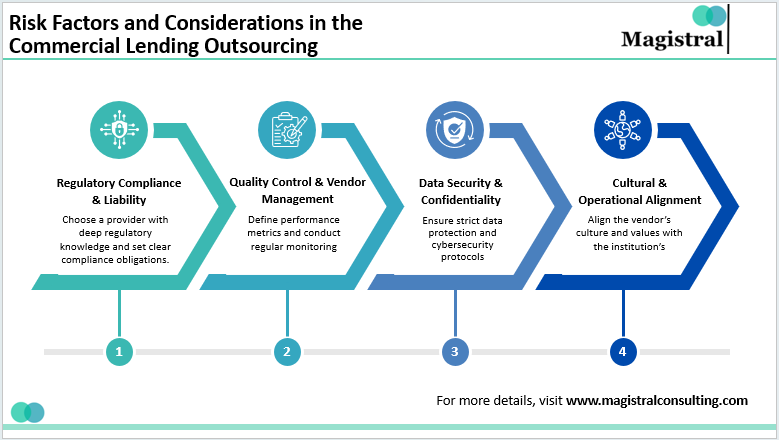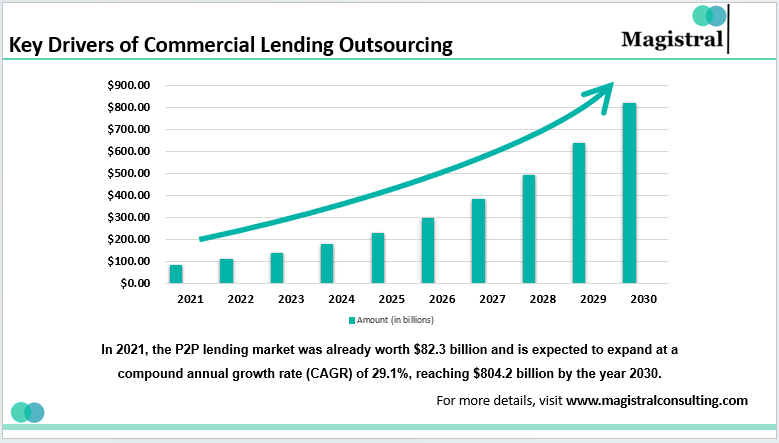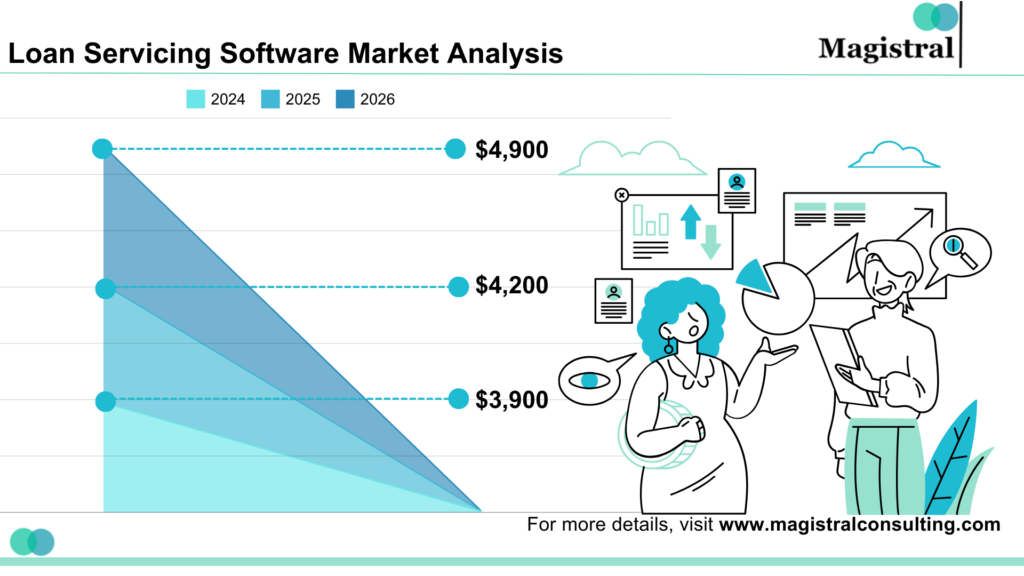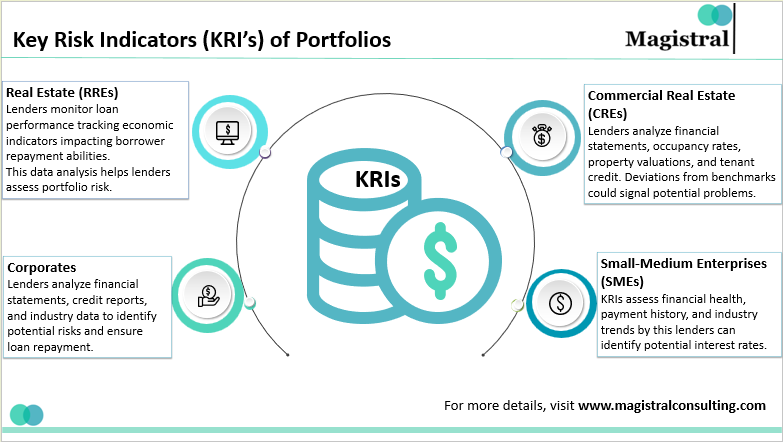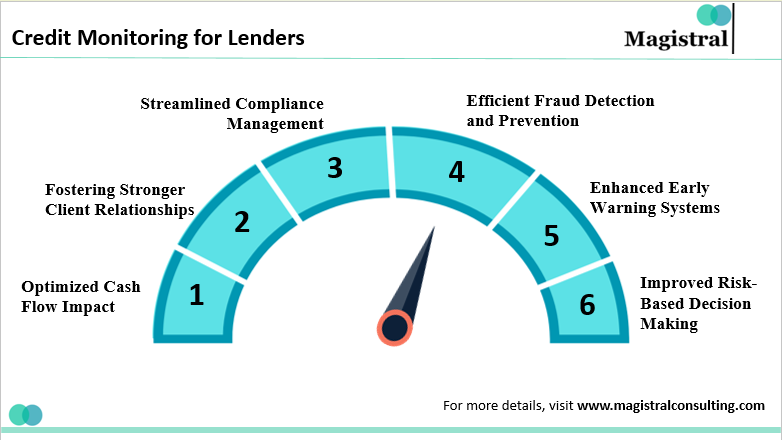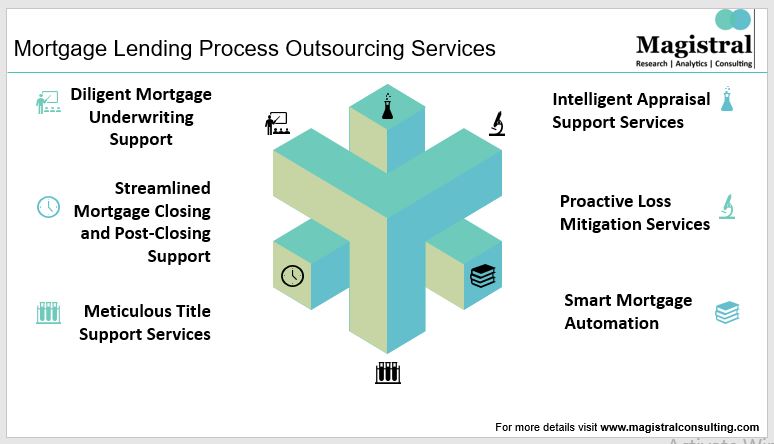The global lending services market is growing quickly and is expected to go from $11.3 trillion in 2024 to $12.2 trillion by 2025 (CAGR 7.8%). Market growth is being driven by digitalization and the growth of AI-driven solutions for global lending services, embedded finance to offer lending solutions, and green asset financing. All of these elements are striving to facilitate access to loans and improve efficiency. While growing markets in regions such as APAC and South America are expanding the market, certain headwinds remain, such as increased interest rates and loan compliance strategies. This article outlines the key trends in the market space, market segmentation, thinking regionally, and strategic opportunities shaping the future of global lending services.
Market Size 2025 and Growth Rate
Recently, the lending market segment (services and products) has experienced robust growth. It will grow from $11284.9 billion in 2024 to $12167 billion in 2025 at a compound annual growth rate (CAGR) of 7.8%. Strong economic growth in emerging markets, increase in internet penetration, rise in consumer spending, and increase in the number of vehicle loans, etc have contributed to the growth in the historic period.

Market Size 2025 and Growth
The lending market size is expected to see strong growth in the next few years. It will grow to $15984.3 billion in 2029 at a compound annual growth rate (CAGR) of 7.1%. Blockchain penetration across various sectors and increasing level of education plays a role in the growth in the forecasted period.
Drivers of the Global Lending Services Market
These are a few factors driving the global lending services market
Growth of Small Businesses
The increasing number of start-ups and small businesses is one of the main drivers of the lending market, as businesses need financing to operate and growing. In the United States, small businesses increased to 33.2 million in 2022 from 32.5 million in 2021 (a difference of 700,000) showing a strong demand for business loans and credit facilities. A rise in small and medium enterprises (SMEs) leads to more economic activity and investment, which drive demand in the lending industry.
Digital Transformation & Online Lending Platforms
The rise of digital lending is driving market growth by enhancing accessibility, efficiency, and customer experience. Online platforms enable faster transactions and data-driven decisions, expanding lender reach. In the UK, electronic debit card transactions rose 8.2% in June 2023, reflecting increased reliance on digital financial services. AI, automation, and embedded finance are set to further transform global lending.
Strong Economic Growth in Emerging Markets
Emerging markets are witnessing a period of strong economic growth, leading to greater demand for credit to fund business investment and consumption. This growth opens very attractive opportunities for lenders to enter and develop new markets
Favorable Government Support & Rising Urbanization
Government programs to promote financial inclusion and support small and medium-sized businesses (SMEs) create a favorable environment for lending businesses to expand their products and services to meet the increased demand associated with these policies. Global urbanization trends increase demand for housing, infrastructure, and related services which translates into demand for needed global lending services products to support that activity.
Key Market Insights
The global lending services industry is divided into three lending segments: corporate lending, household lending, and government lending. The most significant in 2023 was household lending at a value of $4.6 trillion, representing 43.81% of the $10.5 trillion total with a compound annual growth rate (CAGR) of 10.02%, adding $2.8 trillion in value by 2028. Fixed-rate loans represented 57.23% of the total lending market at $6 trillion, but loans with floating rates growing at a CAGR of 7.93% will drive additional growth. While offline global lending services still represented the majority global lending services segment at 51.83% (or $5.4 trillion), online lending has the potential to claim a larger respective share of the loan market at a CAGR of 8.04%, growing to a total loan value of $2.4 trillion.
Regionally, Western Europe claimed the value of 2023, representing 38.49% ($4 trillion) of total lending in that year, followed by North America and Asia-Pacific where both regions benefit from advanced banking infrastructure. South America has the potential for the fastest growth at a CAGR of 12.26% while Africa is the second highest CAGR at 10.34%, resulting from the rise in financial inclusion and digital banks. North America is next at a CAGR of 7.95% and Asia-Pacific at 7.63% on steady lending value and growth. Looking beyond 2023, the U.S. market will generate additional lending up to $1.3 trillion by 2028, led by the continued demand for mortgages, business loans, and additional consumer demand for digital lending products.
The Digital Lending Market
The digital lending market is projected to increase from USD 10.7 billion by 2021 to USD 20.5 billion by 2026 and is anticipated to grow at a CAGR of 13.8% between 2022 and 2026. The Asia-Pacific (APAC) region is likely to grow faster due mainly to government organizations wanting to enhance digital infrastructure. The adoption of digital lending is a result of economic growth, globalization, increased digitalization, and expanding smartphone penetration which is propelling APAC forward as the fastest-growing market. Firms are advancing the efficiency of the platforms using technologies like AI, machine learning, analytics, and blockchain for better enhancing the streamlined platforms into more advanced lending platforms.

The Digital Lending Market
Digital Lending Market Dynamics
Drivers
Increase in Smartphones & Digitalization: Worldwide growth in smartphone capability has increased the need for fast and easy digital lending solutions. Digitalization improves automation and reduces costs and processing time.
Restraints
Reliance on Traditional Lending: Many organizations continue to use outdated practices for global lending services, such as lengthy traditional lending experiences with existing customer bases rigid processes for credit underwriting and/or lending information processing, and low digital literacy.
Opportunities
AI, Machine Learning, & Blockchain Adoption
Advanced technology continues to change digital lending, offering faster more transparent, and scalable loans. Blockchain eliminates middlemen by allowing a direct relationship between lenders and borrowers.
Challenges
Network & Infrastructure
Lack of reliable internet in some developing regions makes seamless digital lending experiences difficult or impossible. Reverting to offline lending activities and manual approvals may be necessary.
Global Lending Services: Key Trends for 2025
The loan industry is rapidly changing due to innovative customer-focused products, both new technologies and existing technologies, sustainability, and regulation. Below are the major trends impacting global lending services in 2025
Customer-Centric Lending
Frictionless Lending
Lenders are improving the digital experience through automated workflows and integrated CRM systems. It then provides a seamless loan origination and approval workflow.
B2C Lending Expands
Partnerships with digital platforms and fintech inspire lenders to develop products and tools that connect directly with consumers. They also offer lending solutions with repayment plans.
Innovation in Lending Models
Subscription-Based & Pay-Per-Use Lending
The rise of Equipment-as-a-Service (EaaS) is influencing lending models, emphasizing flexibility, value-added services, and affordability.
Bespoke Financing Solutions
Customized Financing Solutions: Customized non-traditional lending solutions are evolving with lenders continuing to look for ways to size products into a bundled solution.
Sustainability & Green Lending
Green Asset Financing
Increasing interest in electric vehicles renewable energy projects and sustainable infrastructure are causing lenders to offer sustainable lending or green loan products.
ESG Compliance & Risk Management
New rules and regulations that increase liability around ESG compliance and ESG risk are forcing financial institutions to value sustainable lending practices. Hence, financial institutions and lenders will seek to offer options that ratio to risk, transparency, and compliance, especially surrounding environmental issues.
AI-Driven Digital Transformation
AI-Powered Lending and Automation
AI-Enabled Lending
More companies will continue to invest in AI and data analytics, and increase credit risk assessments, fraud detection, and customer insights, to help reduce human bias and increase objectivity. Finance companies will automate customer decision-making in situations where AI/ML can drive efficiency. It also maintains human expertise in more sophisticated decision-making.
Magistral’s Services for Global Lending
The global lending services sector is undergoing a rapid transformation powered by digital changes, regulatory pressures, and alternative financing models. Magistral Consulting partners with financial institutions to optimize their lending operations & risk management capabilities. It ultimately improves their profitability, using our highly specialized solutions as an outsourcing provider.
Retail Lending
For global lending services, Magistral provides origination services related to consumer targeting, pre-qualification, and generating loan estimates. Underwriting includes determining credit and risk, verifying income, LTV analysis, supporting collateral value, and legal compliance. Disbursement and monitoring entails dispersing loans, conducting escrow checks, credit reporting, and managing collateral. Payoff consists of terminating loans and reconciling accounts at the conclusion of the loan.
Asset-Based Lending
For origination, services encompass asset valuation, loan structuring, and preparing credit synopses. Underwriting includes collateral verification, LTV calculations, financial homework and compliance checks. Disbursement and monitoring include loan disbursement, collateral monitoring, escrow checks, financial checks, and covenants. Payoff involves the release of collateral, loan payoff, and the release of lien.
Real Estate Lending
For global lending services, Magistral supports origination through relationship marketing, cross-selling, and initial loan sizing. Underwriting includes rent roll analysis, market analysis, NAV calculations, lease abstraction, asset valuations, and covenant establishment. Disbursement and monitoring include fund disbursements and cash flow monitoring activities. Payoff consists of loan payoff, pre-payoffs, and lien release of the property.
Mortgage Lending
Origination services include borrower profiling, property valuation, and loan estimates. Underwriting includes financial analysis, collateral appraisals, legal checks, and contract preparation. Disbursement and monitoring include the escrow management, active monitoring, loan modification, managing delinquency, and refinancing. Payoff includes lien release and final account reconciliation.
About Magistral Consulting
Magistral Consulting has helped multiple funds and companies in outsourcing operations activities. It has service offerings for Private Equity, Venture Capital, Family Offices, Investment Banks, Asset Managers, Hedge Funds, Financial Consultants, Real Estate, REITs, RE funds, Corporates, and Portfolio companies. Its functional expertise is around Deal origination, Deal Execution, Due Diligence, Financial Modelling, Portfolio Management, and Equity Research
For setting up an appointment with a Magistral representative visit www.magistralconsulting.com/contact
About the Author
The article is authored by the Marketing Department of Magistral Consulting. For any business inquiries, you can reach out to prabhash.choudhary@magistralconsulting.com
What is the future outlook for digital lending?
The digital lending market is projected to grow from $10.7 billion in 2021 to $20.5 billion by 2026 (CAGR 13.8%). The Asia-Pacific region is expected to lead this growth, driven by increasing smartphone adoption, government-backed digital initiatives, and fintech innovations.
How is AI transforming the lending industry?
AI-powered lending enhances:
Credit Risk Assessment: Faster and more accurate borrower evaluation.
Fraud Detection: AI-driven security systems prevent financial fraud.
Loan Processing Automation: Speeds up approvals and reduces operational costs.
Alternative Credit Scoring: Uses non-traditional data sources for improved risk analysis.
What role does ESG play in lending services?
Green Asset Financing: Loans are increasingly directed toward renewable energy, electric vehicles, and sustainable infrastructure projects.
ESG Compliance: Financial institutions must adhere to sustainability standards to mitigate risks and meet investor expectations.
